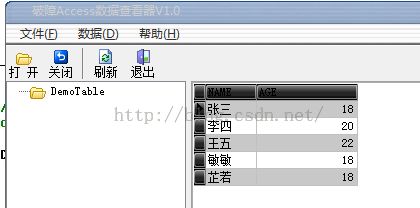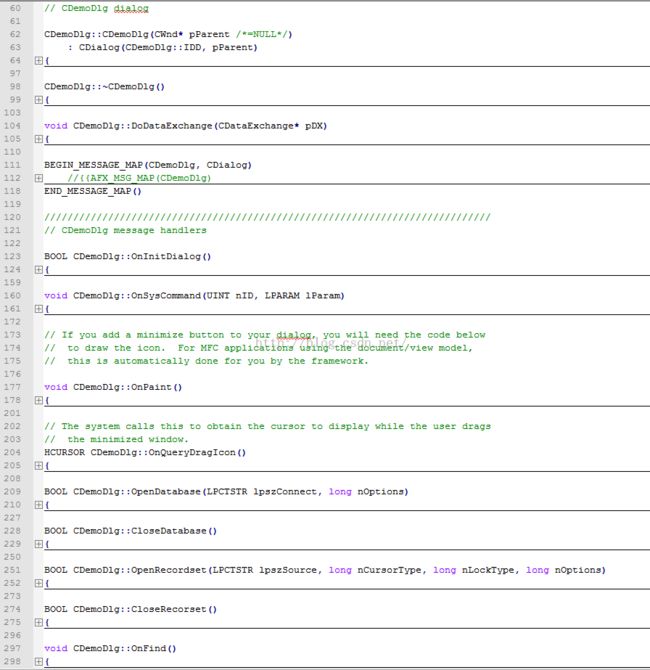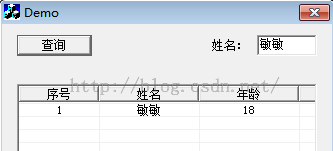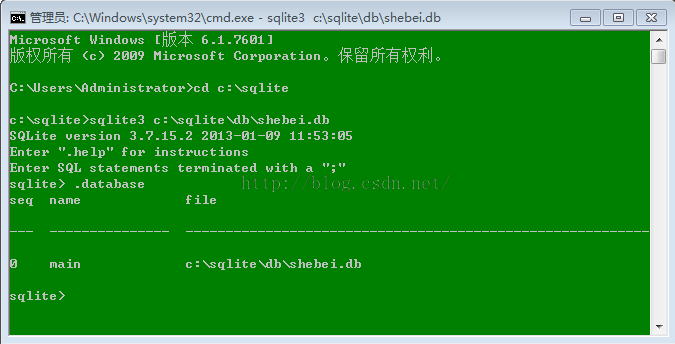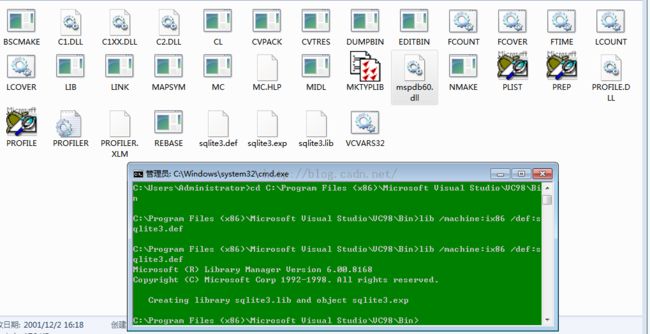VC++ 访问数据库实例详解图解
一 ADO 方式访问 Access
新建一个对话框工程,添加控件,如图;
创建Access数据库如图;
应用程序启动时进行COM初始化;
BOOL CDemoApp::InitInstance()
{
if (!SUCCEEDED(CoInitialize(NULL)))
{
::AfxMessageBox(_T("Failed to initialize COM!"));
return FALSE;
}
AfxEnableControlContainer();
对话框类实现文件代码如下;
// DemoDlg.cpp : implementation file
// Download by http://www.NewXing.com
#include "stdafx.h"
#include "Demo.h"
#include "DemoDlg.h"
#ifdef _DEBUG
#define new DEBUG_NEW
#undef THIS_FILE
static char THIS_FILE[] = __FILE__;
#endif
/////////////////////////////////////////////////////////////////////////////
// CAboutDlg dialog used for App About
class CAboutDlg : public CDialog
{
public:
CAboutDlg();
// Dialog Data
//{{AFX_DATA(CAboutDlg)
enum { IDD = IDD_ABOUTBOX };
//}}AFX_DATA
// ClassWizard generated virtual function overrides
//{{AFX_VIRTUAL(CAboutDlg)
protected:
virtual void DoDataExchange(CDataExchange* pDX); // DDX/DDV support
//}}AFX_VIRTUAL
// Implementation
protected:
//{{AFX_MSG(CAboutDlg)
//}}AFX_MSG
DECLARE_MESSAGE_MAP()
};
CAboutDlg::CAboutDlg() : CDialog(CAboutDlg::IDD)
{
//{{AFX_DATA_INIT(CAboutDlg)
//}}AFX_DATA_INIT
}
void CAboutDlg::DoDataExchange(CDataExchange* pDX)
{
CDialog::DoDataExchange(pDX);
//{{AFX_DATA_MAP(CAboutDlg)
//}}AFX_DATA_MAP
}
BEGIN_MESSAGE_MAP(CAboutDlg, CDialog)
//{{AFX_MSG_MAP(CAboutDlg)
// No message handlers
//}}AFX_MSG_MAP
END_MESSAGE_MAP()
/////////////////////////////////////////////////////////////////////////////
// CDemoDlg dialog
CDemoDlg::CDemoDlg(CWnd* pParent /*=NULL*/)
: CDialog(CDemoDlg::IDD, pParent)
{
//{{AFX_DATA_INIT(CDemoDlg)
//}}AFX_DATA_INIT
// Note that LoadIcon does not require a subsequent DestroyIcon in Win32
m_hIcon = AfxGetApp()->LoadIcon(IDR_MAINFRAME);
if (!SUCCEEDED(m_pConnection.CreateInstance(__uuidof(Connection))))
{
m_pConnection = NULL;
TRACE(_T("Database CreateInstance failed"));
}
if (!SUCCEEDED(m_pRecordset.CreateInstance(__uuidof(Recordset))))
{
m_pRecordset = NULL;
TRACE(_T("Recordset CreateInstance Failed!"));
}
//打开数据库
CString strConnect = _T("Provider=Microsoft.Jet.OLEDB.4.0;Data Source= Demo.mdb");
if (!OpenDatabase(strConnect))
{
AfxMessageBox(_T("数据库打开失败。"));
return;
}
//打开记录集
if (!OpenRecordset(_T("SELECT * FROM DemoTable")))
{
AfxMessageBox(_T("记录集打开失败。"));
return;
}
}
CDemoDlg::~CDemoDlg()
{
m_pRecordset->Close();
m_pConnection->Close();
}
void CDemoDlg::DoDataExchange(CDataExchange* pDX)
{
CDialog::DoDataExchange(pDX);
//{{AFX_DATA_MAP(CDemoDlg)
//}}AFX_DATA_MAP
}
BEGIN_MESSAGE_MAP(CDemoDlg, CDialog)
//{{AFX_MSG_MAP(CDemoDlg)
ON_WM_SYSCOMMAND()
ON_WM_PAINT()
ON_WM_QUERYDRAGICON()
ON_BN_CLICKED(IDC_FIND, OnFind)
//}}AFX_MSG_MAP
END_MESSAGE_MAP()
/////////////////////////////////////////////////////////////////////////////
// CDemoDlg message handlers
BOOL CDemoDlg::OnInitDialog()
{
CDialog::OnInitDialog();
// Add "About..." menu item to system menu.
// IDM_ABOUTBOX must be in the system command range.
ASSERT((IDM_ABOUTBOX & 0xFFF0) == IDM_ABOUTBOX);
ASSERT(IDM_ABOUTBOX < 0xF000);
CMenu* pSysMenu = GetSystemMenu(FALSE);
if (pSysMenu != NULL)
{
CString strAboutMenu;
strAboutMenu.LoadString(IDS_ABOUTBOX);
if (!strAboutMenu.IsEmpty())
{
pSysMenu->AppendMenu(MF_SEPARATOR);
pSysMenu->AppendMenu(MF_STRING, IDM_ABOUTBOX, strAboutMenu);
}
}
// Set the icon for this dialog. The framework does this automatically
// when the application's main window is not a dialog
SetIcon(m_hIcon, TRUE);// Set big icon
SetIcon(m_hIcon, FALSE);// Set small icon
//初始化ListCtrl
CListCtrl* pListCtrl = (CListCtrl*)GetDlgItem(IDC_LIST);
pListCtrl->SetExtendedStyle(LVS_EX_FULLROWSELECT | LVS_EX_GRIDLINES);
pListCtrl->InsertColumn(1, _T("序号"), LVCFMT_CENTER, 80);
pListCtrl->InsertColumn(2, _T("姓名"), LVCFMT_CENTER, 100);
pListCtrl->InsertColumn(3, _T("年龄"), LVCFMT_CENTER, 100);
return TRUE;
}
void CDemoDlg::OnSysCommand(UINT nID, LPARAM lParam)
{
if ((nID & 0xFFF0) == IDM_ABOUTBOX)
{
CAboutDlg dlgAbout;
dlgAbout.DoModal();
}
else
{
CDialog::OnSysCommand(nID, lParam);
}
}
// If you add a minimize button to your dialog, you will need the code below
// to draw the icon. For MFC applications using the document/view model,
// this is automatically done for you by the framework.
void CDemoDlg::OnPaint()
{
if (IsIconic())
{
CPaintDC dc(this); // device context for painting
SendMessage(WM_ICONERASEBKGND, (WPARAM) dc.GetSafeHdc(), 0);
// Center icon in client rectangle
int cxIcon = GetSystemMetrics(SM_CXICON);
int cyIcon = GetSystemMetrics(SM_CYICON);
CRect rect;
GetClientRect(&rect);
int x = (rect.Width() - cxIcon + 1) / 2;
int y = (rect.Height() - cyIcon + 1) / 2;
// Draw the icon
dc.DrawIcon(x, y, m_hIcon);
}
else
{
CDialog::OnPaint();
}
}
// The system calls this to obtain the cursor to display while the user drags
// the minimized window.
HCURSOR CDemoDlg::OnQueryDragIcon()
{
return (HCURSOR) m_hIcon;
}
BOOL CDemoDlg::OpenDatabase(LPCTSTR lpszConnect, long nOptions)
{
ASSERT(m_pConnection != NULL);
ASSERT(lpszConnect != NULL);
ASSERT(AfxIsValidString(lpszConnect));
//打开数据库连接
try
{
return SUCCEEDED(m_pConnection->Open(_bstr_t(lpszConnect),
_T(""), _T(""), nOptions));
}
catch (_com_error& e)
{
TRACE(_T("%s\n"), e.ErrorMessage());
return FALSE;
}
}
BOOL CDemoDlg::CloseDatabase()
{
ASSERT(m_pConnection != NULL);
//关闭数据库连接
try
{
if (m_pConnection->State & adStateOpen)
{
return SUCCEEDED(m_pConnection->Close());
}
else
{
return TRUE;
}
}
catch (_com_error& e)
{
TRACE(_T("%s\n"), e.ErrorMessage());
return FALSE;
}
}
BOOL CDemoDlg::OpenRecordset(LPCTSTR lpszSource, long nCursorType, long nLockType, long nOptions)
{
ASSERT(m_pConnection != NULL);
ASSERT(m_pRecordset != NULL);
ASSERT(lpszSource != NULL);
ASSERT(AfxIsValidString(lpszSource));
//打开记录集
try
{
return (SUCCEEDED(m_pRecordset->Open(_variant_t(lpszSource),
m_pConnection.GetInterfacePtr(),
(CursorTypeEnum)nCursorType,
(LockTypeEnum)nLockType,
nOptions)));
}
catch(_com_error e)
{
TRACE(_T("%s\n"), e.ErrorMessage());
return FALSE;
}
}
BOOL CDemoDlg::CloseRecorset()
{
ASSERT(m_pRecordset != NULL);
//关闭记录集
try
{
if (m_pRecordset->State & adStateOpen)
{
return SUCCEEDED(m_pRecordset->Close());
}
else
{
return TRUE;
}
}
catch (_com_error e)
{
TRACE(_T("%s\n"), e.ErrorMessage());
return FALSE;
}
}
void CDemoDlg::OnFind()
{
if (!(m_pRecordset->State & adStateOpen))
{
AfxMessageBox((_T("记录集未打开。")));
return;
}
//查找条件
CString strCriteria = _T("");
CString strName = _T("");
GetDlgItemText(IDC_NAME, strName);
strCriteria.Format(_T("NAME like '%s'"), strName);
//查找记录集
CListCtrl* pListCtrl = (CListCtrl*)GetDlgItem(IDC_LIST);
pListCtrl->DeleteAllItems();
if (m_pRecordset->BOF && m_pRecordset->adoEOF)
{
return;
}
m_pRecordset->MoveFirst();
int n = 0;
m_pRecordset->Find(_bstr_t(strCriteria), 0, adSearchForward);
while (!m_pRecordset->adoEOF)
{
_variant_t varValue;
CString strName = _T("");
int nAge = 0;
varValue = m_pRecordset->GetCollect(_variant_t(_T("NAME")));
if (varValue.vt != VT_NULL)
{
strName = varValue.bstrVal;
}
else
{
strName = _T("");
}
varValue = m_pRecordset->GetCollect(_variant_t(_T("AGE")));
if (varValue.vt != VT_NULL)
{
nAge = varValue.intVal;
}
else
{
nAge = 0;
}
//刷新ListCtrl
CString strText = _T("");
strText.Format(_T("%d"), n + 1);
pListCtrl->InsertItem(n, strText);
strText.Format(_T("%s"), strName);
pListCtrl->SetItemText(n, 1, strText);
strText.Format(_T("%d"), nAge);
pListCtrl->SetItemText(n, 2, strText);
n++;
m_pRecordset->Find(_bstr_t(strCriteria), 1, adSearchForward);
}
}
代码就不解释了;函数含义比较明确;除了操作数据库,ADO方式还有COM相关操作;
效果:
VC在调试时,Data Source= Demo.mdb,这样的语句,访问的不是Debug目录下的Demo.mdb,是和Debug目录同级;
如果Debug目录同级没有数据库,则打开数据库失败;
工程下载
http://pan.baidu.com/s/1slEEOMD
Access工具下载
http://blog.csdn.net/bcbobo21cn/article/details/51000041
VC6下载
http://blog.csdn.net/bcbobo21cn/article/details/44200205
二 VC 访问 sqlite3
首先用sqlite3创建一个数据库,设备db;
创建表并插入数据;
接下来在VC6中新建一个控制台工程;
代码;
#include <stdio.h>
#include <stdlib.h>
#include <sqlite3.h>
int column_names_printed = 0;
void print_row(int n_values, char** values)
{
int i;
for (i = 0; i < n_values; ++i) {
printf("%10s", values[i]);
}
printf("\n");
}
int print_result(void* data, int n_columns, char** column_values, char** column_names)
{
if (!column_names_printed) {
print_row(n_columns, column_names);
column_names_printed = 1;
}
print_row(n_columns, column_values);
return 0;
}
int main()
{
sqlite3 *db=NULL;
char *errMsg = NULL;
int rc;
rc = sqlite3_open("shebei.db", &db);
if( rc ){
fprintf(stderr, "Can't open database: %s\n", sqlite3_errmsg(db));
sqlite3_close(db);
exit(1);
}
else printf("open shebei.db successfully!\n");
column_names_printed = 0;
rc = sqlite3_exec(db, "SELECT shebei.* FROM shebei;", print_result, NULL, &errMsg);
column_names_printed = 1;
printf("\n");
printf("error code: %d\n", rc);
printf("error message: %s\n", errMsg);
sqlite3_close(db);
return 0;
}
注意如果如下的换行语句,
rc = sqlite3_exec(db, "CREATE TABLE students(number varchar(10), name varchar(10), \sex varchar(6), age varchar(2));", NULL, NULL, NULL);
\之后如果有空格;则会出现;
Y:\dddd20\sqlitedemo1\demo1.cpp(39) : warning C4129: ' ' : unrecognized character escape sequence
删除空格即可;
现在我们有sqlite3.dll跟一个sqlite3.def文件,并没有用于VC++6.0的lib文件,可以利用sqlite3.def文件生成,步骤如下:
1.将sqlite3.h(D:\sqlite-amalgamation-3_6_23.zip)拷贝到C:\Program Files\Microsoft Visual Studio\VC98\Include目录下,这时编译可通过,但链接错误,因为没有LIB文件()
2.启动一个命令行程序,进入VC的安装目录C:\Program Files\Microsoft Visual Studio\VC98\Bin,在这个目录下面有一个LIB.exe文件,使用它就能生成sqlite3.lib文件,将sqlite3.def文件放到相同目录,或者绝对路径也可以, 然后在命令行输入如下命令:
LIB /MACHINE:IX86 /DEF:sqlite3.def
该命令生成两个文件:sqlite3.lib和sqlite3.exp
运行该命令时,如果提示找不到MSPDB60.DLL文件,可从其它目录拷贝至Bin目录下
3.将生成的sqlite3.lib拷贝到Lib目录下,将sqlite3.dll拷贝到C:\WINNT\system32目录下
4.将sqlite3.lib加入到工程链接中,Project->Settings,Link选项卡,Object/library modules最后添入sqlite3.lib
参阅:http://mxdxm.iteye.com/blog/634772
操作过程和完成结果如下图;
把环境配置好;编译运行程序;效果如下;
工程下载
sqlite相关下载,包括,h、Lib、dll文件;
http://pan.baidu.com/s/1slEEOMD
三 ADO访问数据库出现C2146、C2501
demodlg.h(25) : error C2146: syntax error : missing ';' before identifier 'm_pConnection'
demodlg.h(25) : error C2501: '_ConnectionPtr' : missing storage-class or type specifiers
demodlg.h(25) : error C2501: 'm_pConnection' : missing storage-class or type specifiers
在stdafx.h中加入如下语句再构建;
#import "c:\Program Files (x86)\common files\system\ado\msado15.dll"\
no_namespace\
rename("EOF", "adoEOF")
另外再看是否少了};
